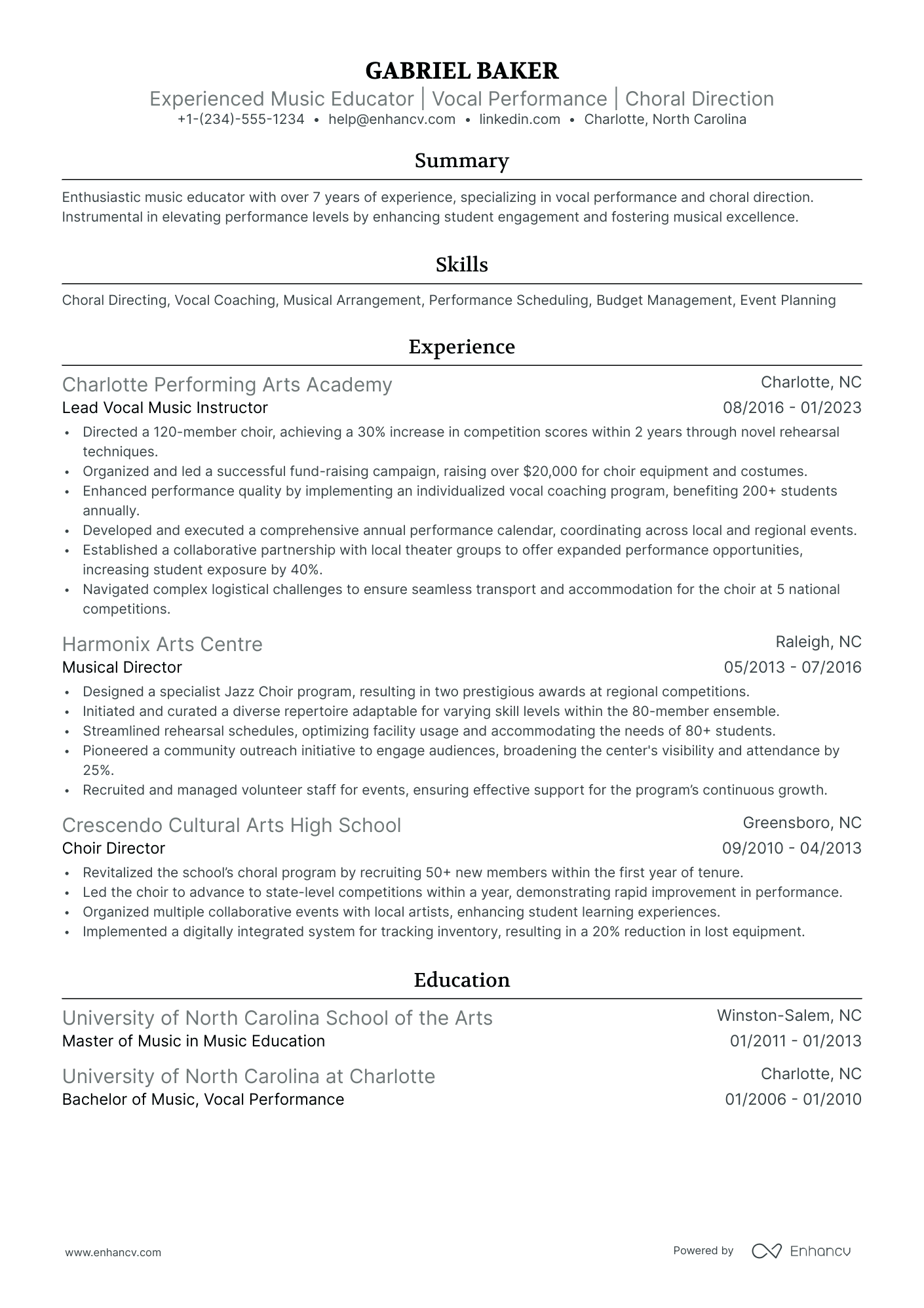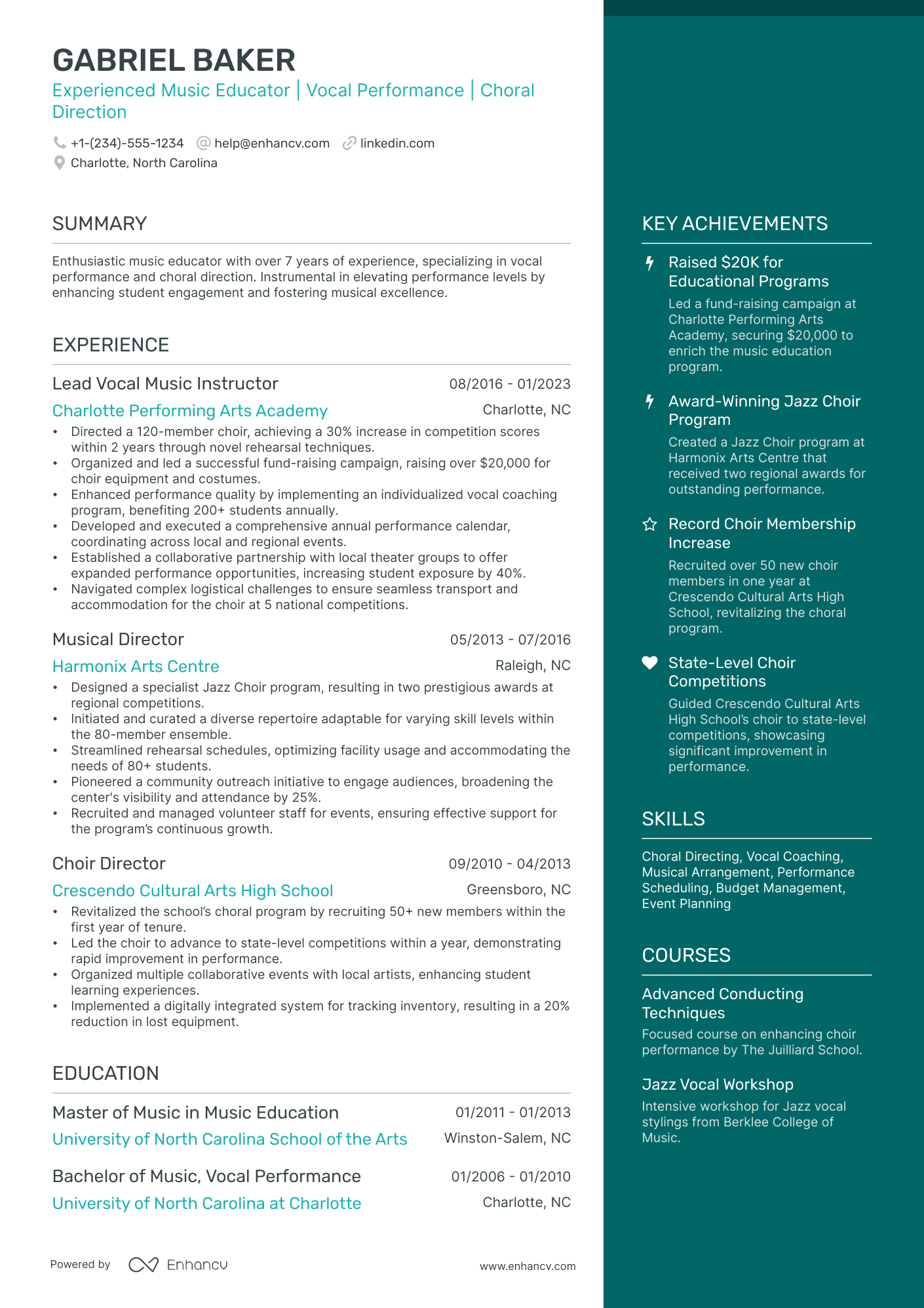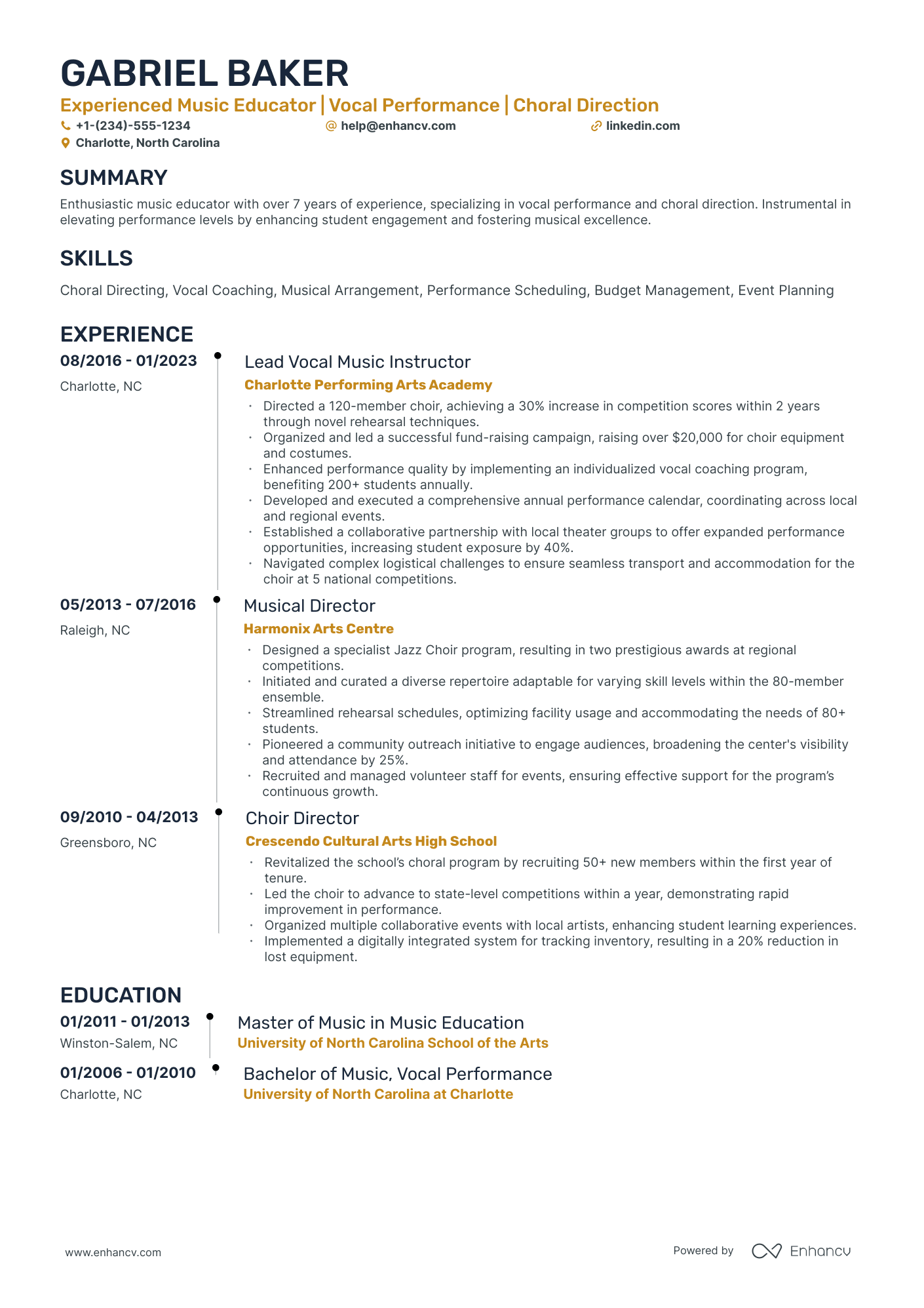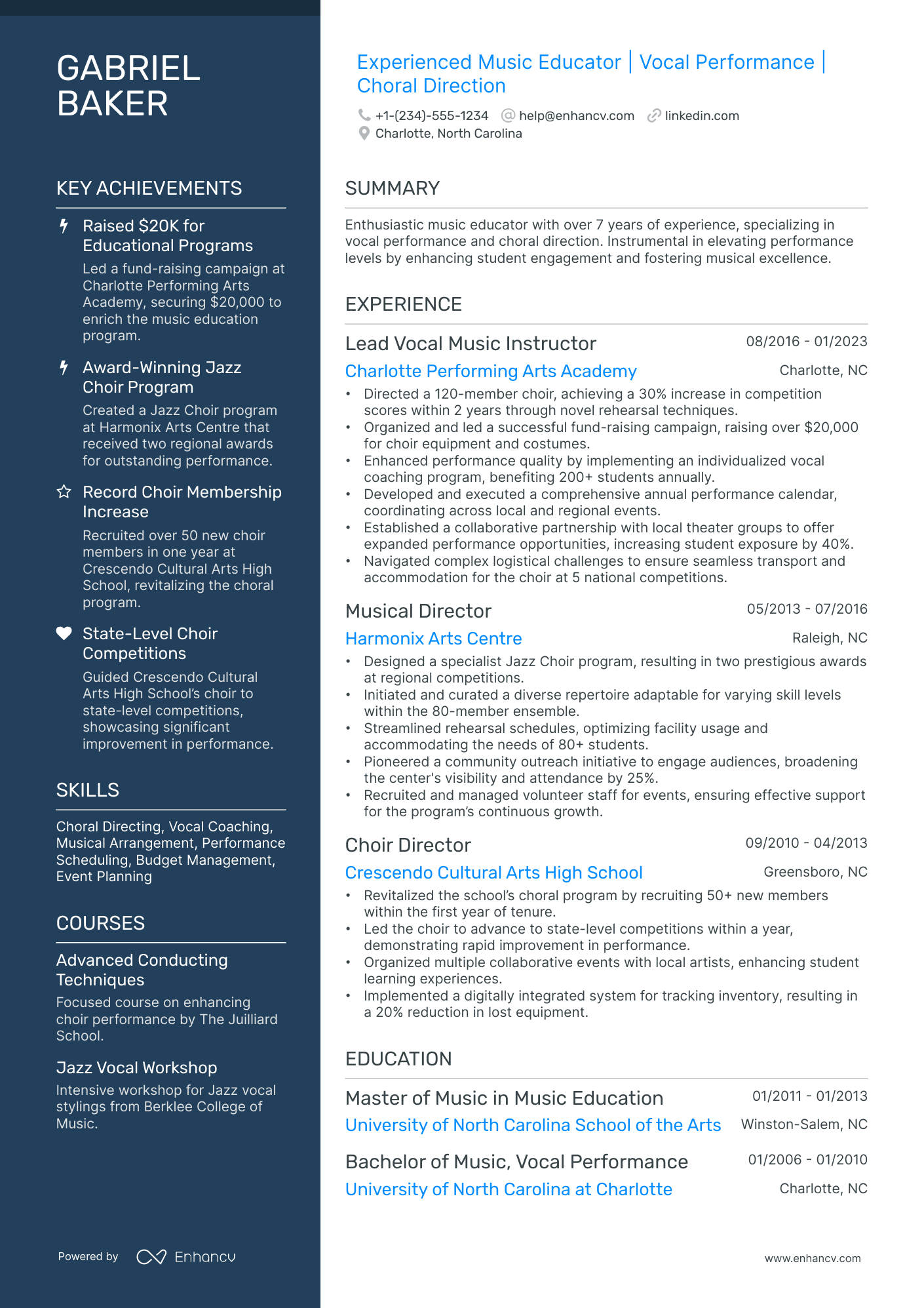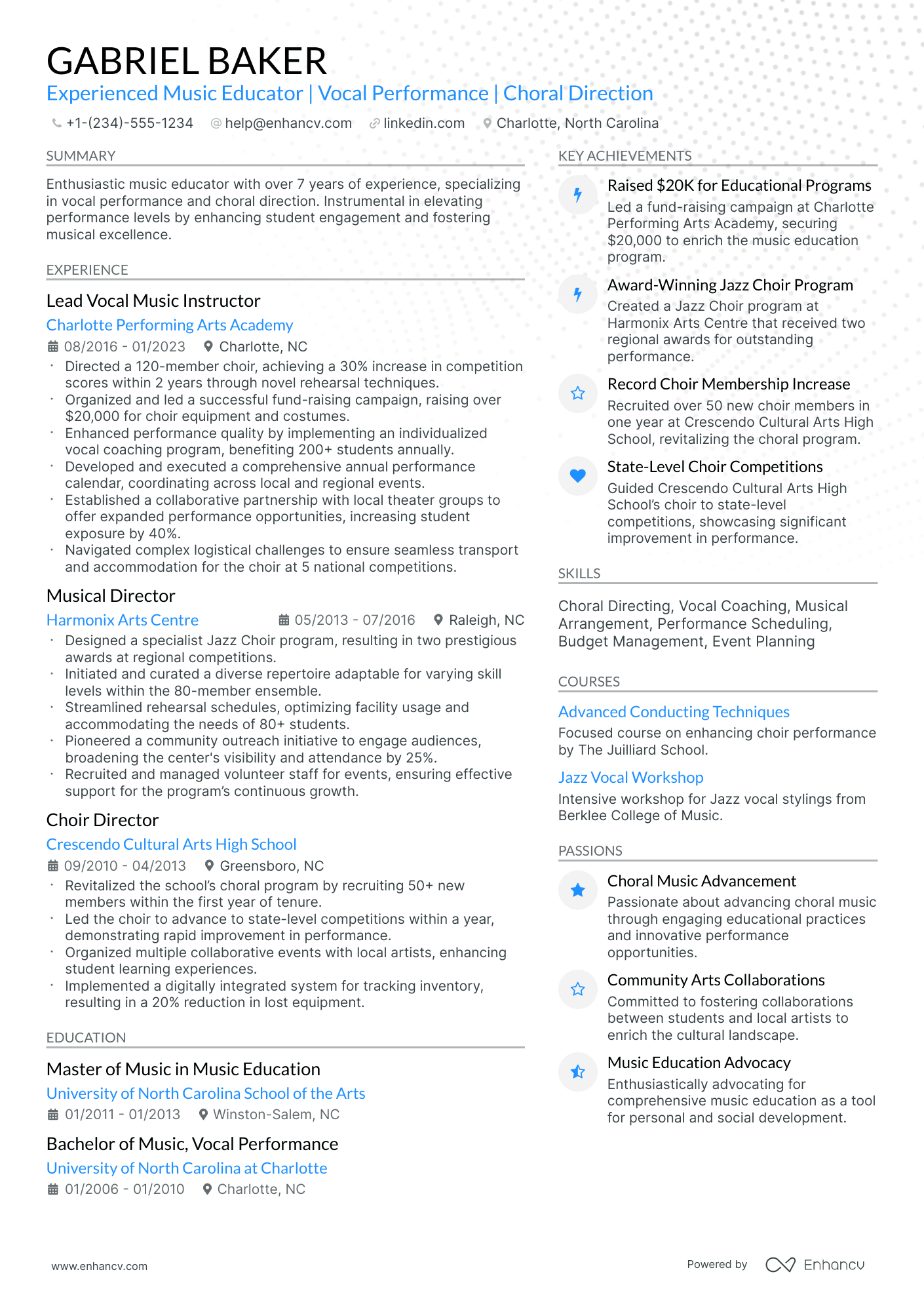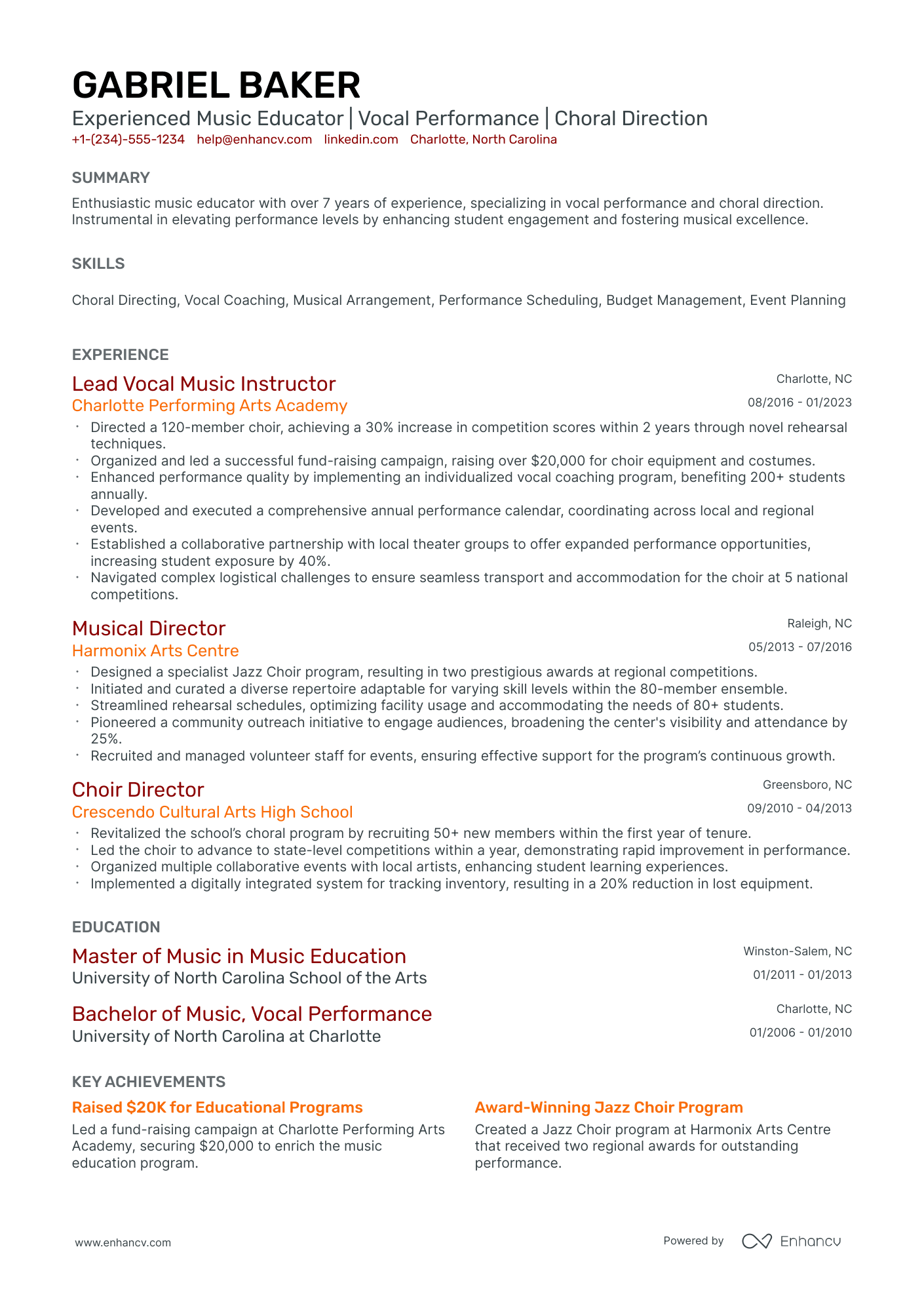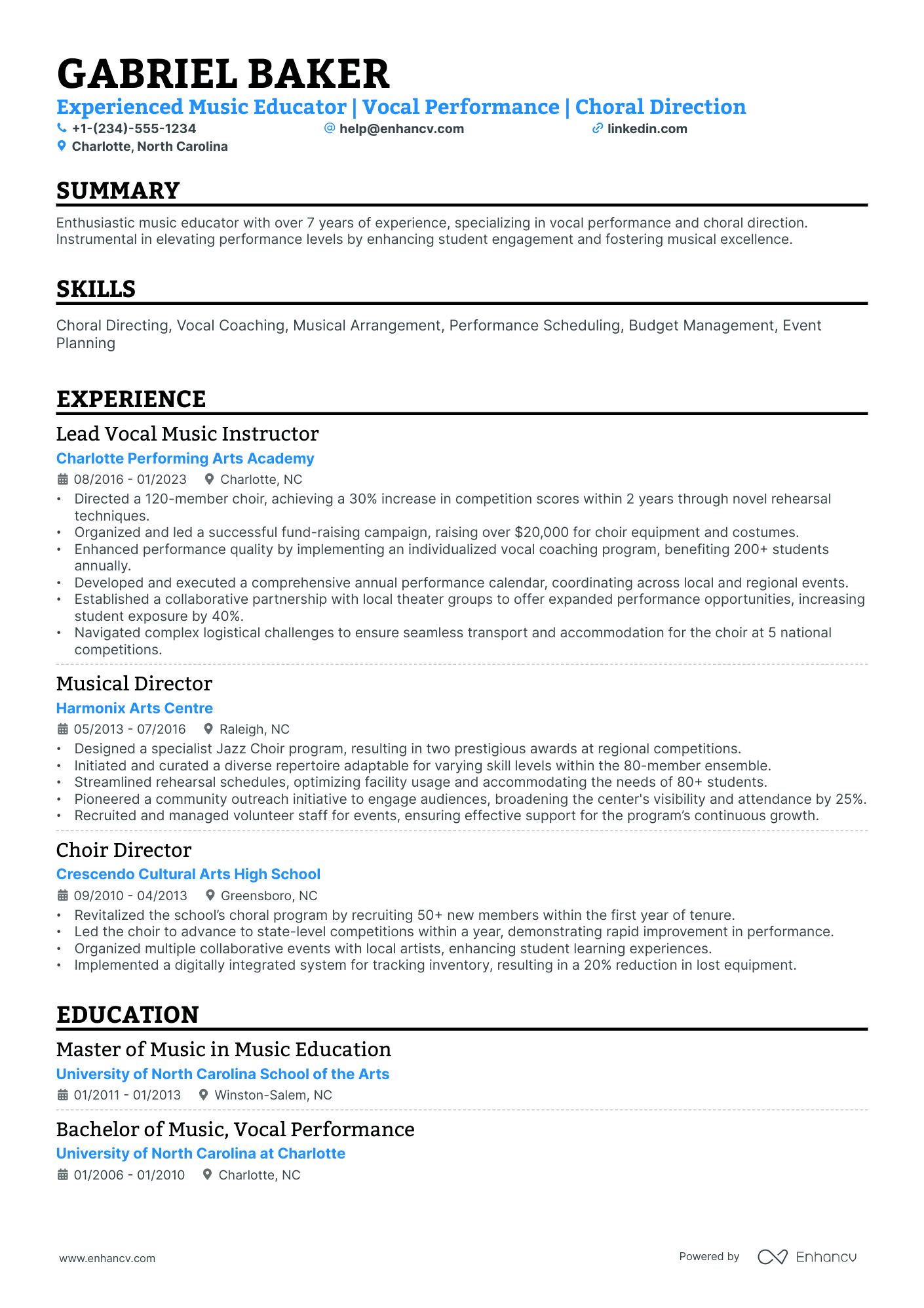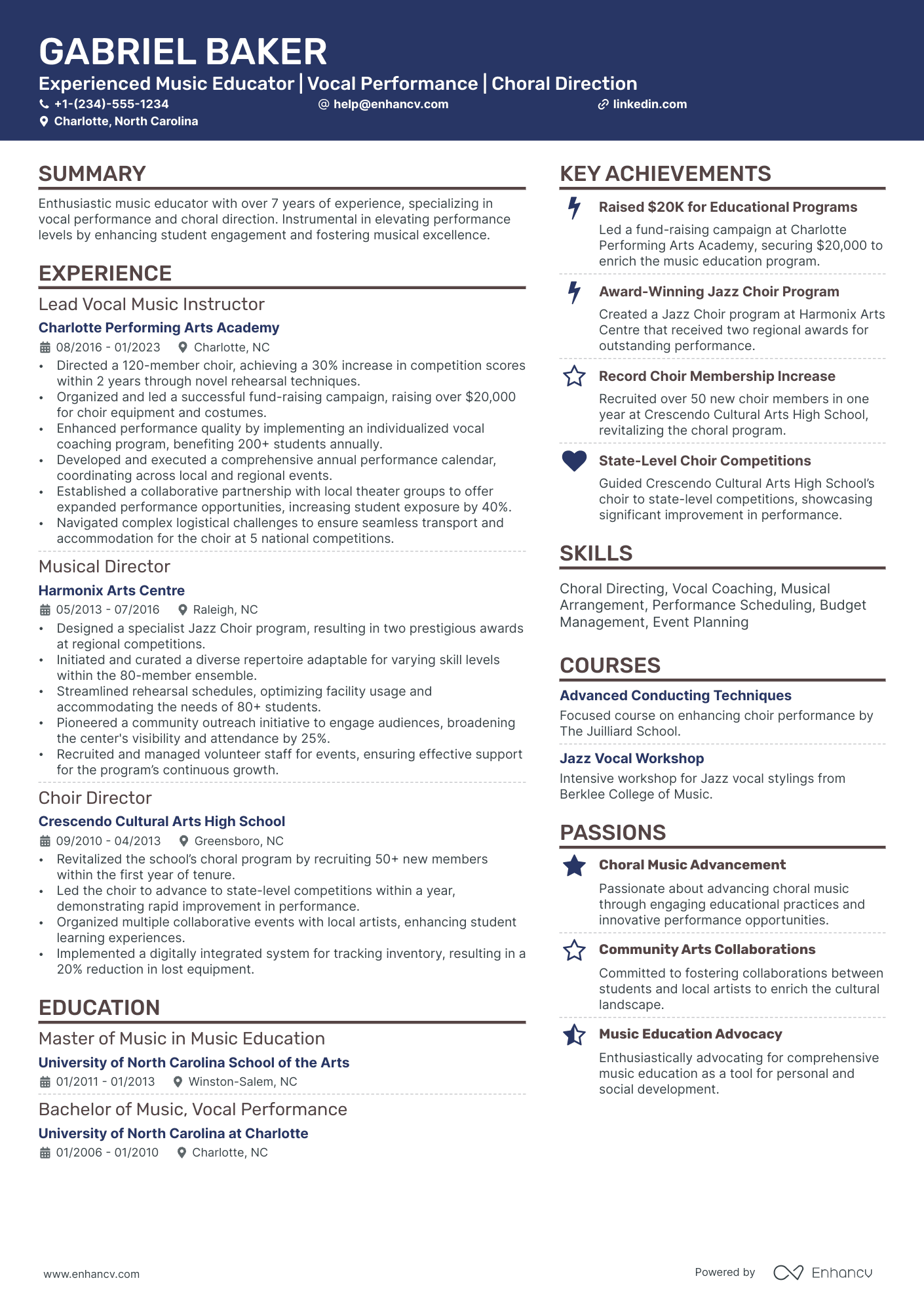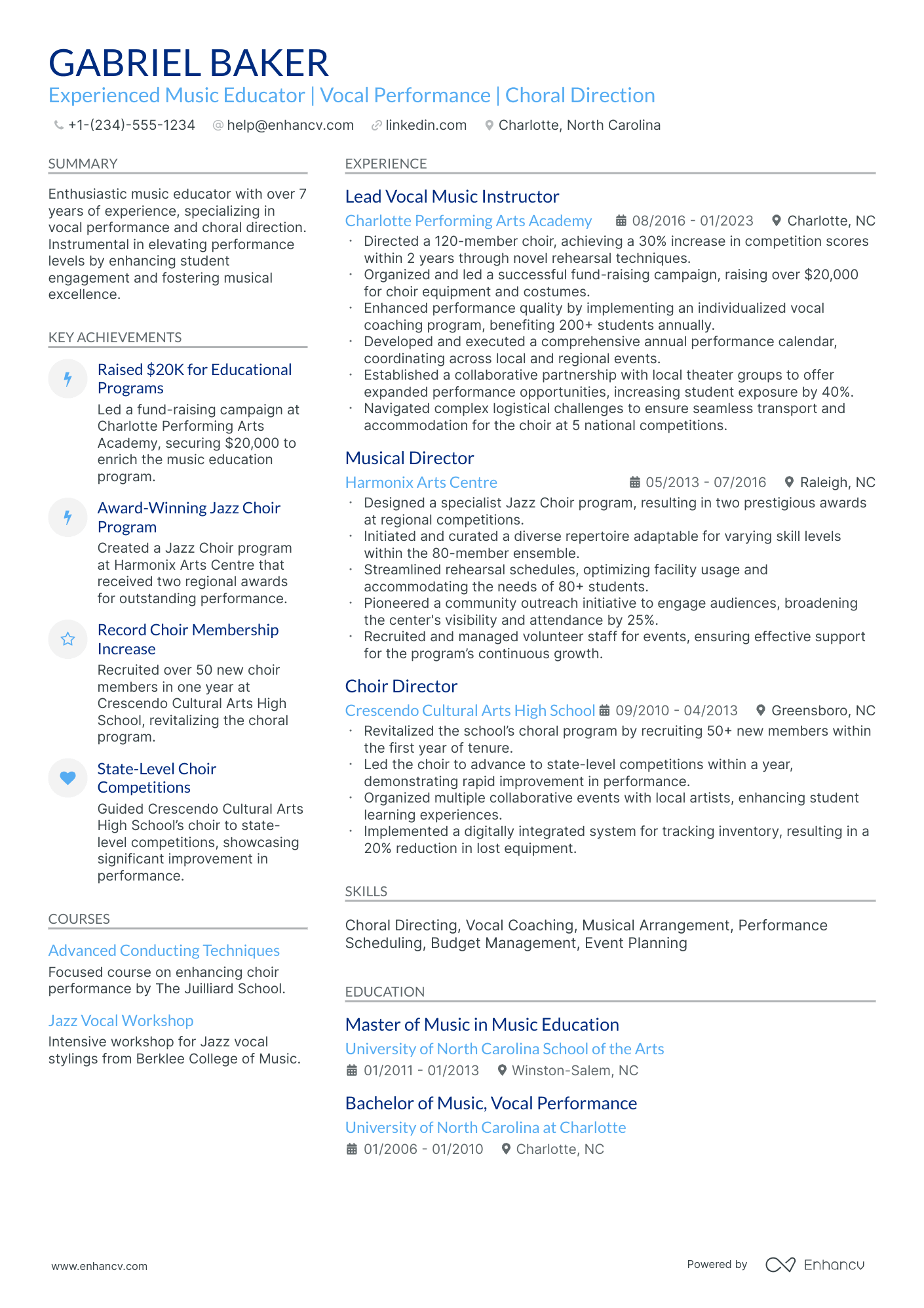One specific resume challenge you might face as a music director is effectively showcasing the wide range of skills required for the role, from musical expertise to leadership abilities. Our comprehensive guide offers tailored suggestions to help you highlight your multifaceted skill set and present a compelling narrative that resonates with potential employers.
- Utilize real-life examples to refine your music director resume;
- Effectively write the experience section of your music director resume, even if you have minimal or no professional experience;
- Incorporate the industry's top 10 essential skills throughout your resume;
- Include your education and certifications to highlight your specific expertise.
If the music director resume isn't the right one for you, take a look at other related guides we have:
Tips and tricks for your music director resume format
Before you start writing your resume, you must first consider its look-and-feel - or resume format . Your professional presentation hence should:
- Follow the reverse-chronological resume format , which incroporates the simple logic of listing your latest experience items first. The reverse-chronological format is the perfect choice for candidates who have plenty of relevant (and recent) experience.
- State your intention from the get-go with a clear and concise headline - making it easy for recruiters to allocate your contact details, check out your portfolio, or discover your latest job title.
- Be precise and simple - your resume should be no more than two pages long, representing your experience and skills that are applicable to the music director job.
- Ensure your layout is intact by submitting it as a PDF. Thus, your resume sections would stay in place, even when assessed by the Applicant Tracker System (ATS).
Keep in mind market-specific formats – for example, a Canadian resume might follow a different structure.
Upload & Check Your Resume
Drop your resume here or choose a file. PDF & DOCX only. Max 2MB file size.
PRO TIP
If the certificate you've obtained is especially vital for the industry or company, include it as part of your name within the resume headline.
The key to your music director job-winning resume - present your expertise with these sections:
- A header to make your resume more scannable
- Snapshot of who you are as a professional with your resume soft skills, achievements, and summary or objective
- Job advert keywords in the skills section of your resume
- Resume experience quantifying your past job successes with metrics
- A relevant education, certification, and technical sills section to provide background to your technological/software capabilities
What recruiters want to see on your resume:
- Experience in musical direction and successful track record of productions or performances.
- Proficiency in music theory, composition, and arrangement, as well as knowledge of various musical genres and styles.
- Strong leadership and communication skills for leading rehearsals, coordinating with production staff, and managing musicians.
- Ability to work collaboratively with directors, choreographers, and performers to achieve the desired artistic vision.
- Technical skills related to sound design, score reading, and familiarity with music software and equipment.
Five dos for building your music director resume experience section
The best strategic approach to your music director resume experience section is to support your particular responsibilities with actions and achievements.
For example, you could list:
- Up to six responsibilities in your day-to-day work, supported by why they're important for your role, department, or organization;
- Experience items that have helped you sustain and enhance your technical knowledge within the field, or, perhaps, have helped you grow as a professional;
- Any metrics that pinpoint your success within your past roles;
- How you've solved specific problems in your day-to-day work;
- Strategies and solutions you've implemented for growth - and how that growth was measured.
The music director resume experience is your best shot at making a good first impression on recruiters. That's why we've included some real-world professional examples to get you thinking about how you present your experience:
- Expertly conducted over 100 performances spanning classical to contemporary works, significantly increasing season ticket sales by 40% over the tenure.
- Collaboratively initiated and developed an educational outreach program to foster music appreciation in local schools, impacting over 2500 students annually.
- Led the orchestra through a critically acclaimed European tour, enhancing the ensemble’s international reputation and securing future international engagements.
- Composed original scores for 5 award-winning theatrical productions, receiving accolades for innovation and elevating the company's profile.
- Implemented a new digital music archiving system, improving the retrieval efficiency by 70% and ensuring preservation of the company’s musical assets.
- Spearheaded a cross-functional collaboration with the marketing department to redesign concert programs, enhancing audience engagement and merchandise sales.
- Produced and directed cutting-edge music festivals featuring over 50 international artists, driving a 60% increase in annual festival attendance.
- Pioneered the integration of mixed media and virtual reality in live performances, setting a new standard for immersive concert experiences.
- Negotiated and secured lucrative partnerships with major streaming services, diversifying revenue streams and expanding the organization's digital presence.
- Arranged and directed over 200 Sunday services and special events, consistently receiving commendations for outstanding musical selection and performance quality.
- Oversaw the successful fundraising and subsequent restoration of a historic pipe organ, ensuring the instrument's longevity for future generations.
- Expanded the church choir by 35% through community engagement and innovative recruitment strategies, enhancing the breadth and depth of choral performances.
- Curated and led a campus-wide music festival with participation from over 200 students, fostering an environment of cultural exchange and artistic collaboration.
- Pioneered a digital music curriculum, integrating modern technology into traditional music education, benefiting over 500 students per semester.
- Directed the university symphony to win first place at the National Collegiate Music Competition, garnering recognition and attracting prospective talent.
- Developed and led a world-class vocal coaching program, resulting in student performers winning three international singing competitions in consecutive years.
- Coordinated with prominent composers to facilitate contemporary music workshops, broadening the musical repertoire and skills of over 100 participants.
- Instrumental in the strategic planning and execution of a multi-cultural concert series, achieving a 25% year-over-year increase in community outreach and attendance.
- Directed and produced original soundtracks for 10 feature films, three of which were nominated for best original score in international film awards.
- Fostered collaborative relationships with film directors and studios, securing 5 long-term contracts for future scoring projects.
- Introduced a comprehensive digital asset management system for audio files that increased the post-production efficiency by 50%.
- Strategically revitalized a community orchestra program by recruiting top local talent, doubling membership and enhancing the performance quality.
- Orchestrated an annual music concert series that contributed to a 30% increase in local business sponsorships and funding for music education programs.
- Implemented a successful musician mentoring initiative pairing professional musicians with students, resulting in a 45% rise in student enrollment in music courses.
Quantifying impact on your resume
- Include the number of musical productions you've directed, as this showcases your experience and leadership capabilities.
- Mention the size of the ensembles you have managed, to demonstrate your ability to handle diverse sizes of musical groups.
- List the budget size you've worked with for each production, as this indicates your financial management skills.
- Quantify the audience size for performances, which highlights your appeal and success in public engagements.
- Specify the number of concerts or events you've conducted annually, to show your capability to maintain a busy and consistent schedule.
- Detail any increase in ticket sales or funding under your leadership, proving your positive impact on the organization's growth and profitability.
- Describe the extent of your repertoire by stating the number of works you've conducted, revealing your versatility and breadth of knowledge.
- Include any significant percentage growth in musician retention or recruitment, to display your effectiveness in team building and maintaining morale.
Action verbs for your music director resume
Guide for music director professionals kicking off their career
Who says you can't get that music director job, even though you may not have that much or any experience? Hiring managers have a tendency to hire the out-of-the-blue candidate if they see role alignment. You can show them why you're the best candidate out there by:
- Selecting the functional skill-based or hybrid formats to spotlight your unique value as a professional
- Tailoring your music director resume to always include the most important requirements, found towards the top of the job ad
- Substituting the lack of experience with other relevant sections like achievements, projects, and research
- Pinpoint both achievements and how you see yourself within this specific role in the music director resume objective.
Recommended reads:
PRO TIP
Mention specific courses or projects that are pertinent to the job you're applying for.
Shining a light on your music director hard skills and soft skills
To win recruiters over, you must really have a breadth of skill set presented and supported within your music director resume.
On hiring managers' checklists, you'd initially discover hard or technical skills. Those are the technology (and software) that help you perform on the job. Hard skills are easy to quantify via your education, certificates, and on-the-job success.
Another main criterion recruiters are always assessing your music director resume on is soft skills. That is your ability to communicate, adapt, and grow in new environments. Soft skills are a bit harder to measure, as they are gained both thanks to your personal and professional experience.
Showcase you have the ideal skill set for the role by:
- Dedicating both a skills box (for your technical capabilities) and an achievements or strengths section (to detail your personal skills).
- When listing your skills, be specific about your hard skills (name the precise technology you're able to use) and soft skills (aim to always demonstrate what the outcomes were).
- Avoid listing overused cliches in the skills section (e.g. Microsoft Office and Communication), unless they're otherwise specified as prominent for the role.
- Select up to ten skills which should be defined via various sections in your resume skills sidebar (e.g. a technical skills box, industry expertise box with sliders, strengths section with bullets).
Spice up your resume with leading technical and people skills, that'd help you get noticed by recruiters.
Top skills for your music director resume:
Music Composition Software
Digital Audio Workstations (DAWs)
Music Notation Software
Audio Editing Tools
Sound Mixing Equipment
Microphone Techniques
Music Theory Knowledge
Conducting Techniques
Recording Studio Technology
Music Licensing Knowledge
Leadership
Communication
Creativity
Collaboration
Adaptability
Problem-Solving
Time Management
Attention to Detail
Conflict Resolution
Emotional Intelligence
PRO TIP
Mention specific courses or projects that are pertinent to the job you're applying for.
How to include your education and certifications on your resume
We're taking you back to your college days with this part of our guide, but including your relevant higher education is quite important for your resume.
Your degree shows recruiters your dedication to the industry, your recent and relevant know-how, and some form of experience in the field.
Your music director resume education should:
- Include your applicable degrees, college (-s) you've graduated from, as well as start and end dates of your higher education;
- Skip your high school diploma. If you still haven't graduated with your degree, list that your higher education isongoing;
- Feature any postgraduate diplomas in your resume header or summary - this is the perfect space to spotlight your relevant MBA degree;
- Showcase any relevant coursework, if you happen to have less professional experience and think this would support your case in being the best candidate for the role.
As far as your job-specific certificates are concerned - choose up to several of the most recent ones that match the job profile, and include them in a dedicated section.
We've saved you some time by selecting the most prominent industry certificates below.
The top 5 certifications for your music director resume:
- Certificate of Advanced Studies in Music Direction (CASMD) - Berklee College of Music
- Graduate Certificate in Conducting (GCC) - University of Southern California
- Master of Music in Conducting (MM) - Eastman School of Music
- Professional Studies Certificate in Orchestral Conducting (PSCOC) - The Juilliard School
- Artist Diploma in Orchestral Conducting (ADOC) - Yale School of Music
PRO TIP
List your educational qualifications and certifications in reverse chronological order.
Recommended reads:
Professional summary or objective for your music director resume
music director candidates sometimes get confused between the difference of a resume summary and a resume objective.
Which one should you be using?
Remember that the:
- Resume objective has more to do with your dreams and goals for your career. Within it, you have the opportunity to showcase to recruiters why your application is an important one and, at the same time, help them imagine what your impact on the role, team, and company would be.
- Resume summary should recount key achievements, tailored for the role, through your career. Allowing recruiters to quickly scan and understand the breadth of your music director expertise.
The resume objectives are always an excellent choice for candidates starting off their career, while the resume summary is more fitting for experienced candidates.
No matter if you chose a summary or objective, get some extra inspiration from real-world professional music director resumes:
Resume summaries for a music director job
- With over 15 years of experience conducting renowned orchestras across Europe, I have developed a keen sense for blending traditional and contemporary techniques to create unforgettable performances. I bring a repertoire of versatility, having led classical, jazz, and modern ensembles, and my leadership was pivotal in securing the Symphony of Vienna's award for Best Classical Performance in 2021.
- As a former production manager with a decade-long career in the television industry, I bring a unique perspective to music direction. Leveraging strong organizational skills and a creative vision, I have orchestrated live shows and studio recordings that have significantly boosted viewership figures, making a seamless transition into orchestrating musical performances that captivate and inspire audiences.
- Seasoned music educator and choir director with 20 years of experience, I am adept at arranging scores, mentoring young talent, and igniting passion for music across various genres. My proudest achievement was directing the youth choir that performed at the national choral competition, earning top honors for three consecutive years.
- An accomplished film score composer looking to translate cinematic soundscapes to live concert experiences. With a track record of scoring over 50 feature films, my ability to evoke emotion through music has been praised by critics and has earned me two international awards for Best Original Soundtrack in the past five years.
- As a recent graduate with a Master’s degree in Music Direction from the Berklee College of Music, I am eager to apply my extensive theoretical knowledge and hands-on internship experience. My goal is to contribute to magnificent live productions, harnessing my fresh insights and passion for music to create memorable events that resonate with diverse audiences.
- Eager to embark on a career in music direction, having nurtured a lifelong admiration for the performing arts alongside a successful career in marketing. My solid track record of orchestrating large-scale corporate events and campaigns has equipped me with exceptional project management skills ready to be channeled into producing dynamic and enthralling musical shows.
Optimize your resume summary and objective for ATS
Drop your resume here or choose a file.
PDF & DOCX only. Max 2MB file size.
Recruiters' favorite additional music director resume sections
When writing your music director resume, you may be thinking to yourself, " Is there anything more I can add on to stand out? ".
Include any of the below four sections you deem relevant, to ensure your music director resume further builds up your professional and personal profile:
Key takeaways
- The layout of your resume should take into consideration your professional background while integrating vital sections and design elements;
- Highlight your most pertinent achievements for the role all through different sections;
- Be very specific when selecting your certifications, hard skills, and soft skills to showcase the best of your talents;
- Include within the top one-third of your music director resume a header and summary to help recruiters understand your experience and allocate your contact details. A skills box is optional, but it will help you align your expertise with the role;
- Detail the full extent of your professional experience with specific bullets that focus on tasks, actions, and outcomes.
